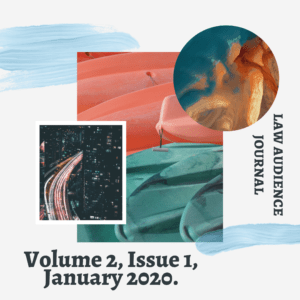AUTHORED BY: MS. SHRISHA GAUTAM (BBA. LL.B (Hons)), CO-AUTHORED BY: MR. SOUMYADIP GHORAI (BBA. LL.B (Hons)), Symbiosis Law School, Pune.
I. INTRODUCTION:
“Before delving into the issue of Marital Rape, we need to have a brief discussion on what rape is because the word “rape” plays an integral role in the concept of marital rape. Rape is defined under Section 375 of the Indian Penal Code, 1860.
According to Section 375, rape is unlawful sexual intercourse between a man and a woman without the consent of the women or against her will under any circumstances enumerated under Section 375 of the Indian Penal Code.[1]
A committee headed by Justice J.S. Verma was put into work to look into the possible amendments to the Criminal Law to ensure quicker trials and harsher punishments to the person who is accused and proved to commit sexual offences. Most recommendations given by this committee were taking into consideration and given legislative effect.[2]
Although Section 375 of the Indian Penal Code defines rape and Section 376 of the Indian Penal Code provides for the punishment in cases of rape, the Act fails to protect married women who are subjected to rape by their own husband.”
II. TYPES OF MARITAL RAPE:
The following are the kinds of marital rape[3]:
- Battering Rape:
This is a kind of marital rape where women experience both physical and sexual violence. Some instances of this may be a situation where the husband hits the wife during sexual intercourse or where the husband coerces his wife to have sex against her will. In most cases, the victim falls under this category.
- Force-only rape:
This is a type where a husband only uses force to coerce their wives. These are the cases where battering is not necessary. This is a category where women who refuse sexual intercourse face this kind of assault.
- Obsessive rape:
This is the most heinous kind of marital rape. In this kind of rape, assaults that are inflicted are brutal torture in its most violent form. This type of rape can also be labelled as sadistic rape.
III. INDIAN PERSPECTIVE:
In India, marital rape exists in fact but not in law. There is a considerable reluctance towards the acceptance of marital rape as a criminal offence, but the Indian Judiciary has done its part towards acceptance of marital rape by recognizing the existence of such a heinous act that plagues Indian society. In the landmark judgment of Bodhisattwa Gautam v. Subhra Chakraborty,[4] the Court said that rape is a crime that is against the basic human rights and is against the most cherished fundamental right enshrined under Article 21 of the Constitution of India. In India, there have been advances in the area of domestic violence of women by the passage of the Domestic Violence Act, but the legislation has failed to recognize marital rape as a criminal offence and only focus on physical abuse, and since the exception to Section 375 of the Indian Penal Code is more specific to the nature of marital rape, the women who wish to confront sexual violence are denied of justice due to the law in force. Marital rape cannot be considered to be criminalized because the Indian Government is of the belief that marriage is considered sacred in India and criminalizing marital rape will defunct the whole institution of marriage.
The then Home Minister, Haribhai Parathibhai Chaudhary while answering a question in the parliament about criminalizing marital rape commented that the international understanding of marital rape could not be applied in the Indian scenario because of various factors which include the level of education, illiteracy, poverty, values, religious beliefs and many more. When confronted with the fact that the UN Committee on the elimination of discrimination against women has recommended that India should criminalize marital rape, the Home Minister stated that The Law Commission of India in its 172nd Report on review of rape laws did not recommend amending the exception in the Indian Penal Code.[5] Even the Supreme Court following the trends refused a women’s plea to declare marital rape as a criminal offence and stated that personal cause should not be mixed up with a public cause.[6]
IV. LEGISLATIVE PROVISIONS:
- Indian Penal Code, 1860:
Section 375 of the Indian Penal Code deals with the provision of rape. This section is hugely archaic in relation to its exception, which states that Sexual Intercourse between a man and his wife and the wife not being under the age of 15 is not rape. There is no legal protection accorded to a wife in respect of her Human Rights. The damage done in Exception 2 of Section 375 of the Indian Penal Code was somewhat reduced by Section 376B which states that if the husband has sexual intercourse with a wife who was living separately under the decree of judicial separation or otherwise shall be punished with an imprisonment of not less than two years but may also extend to 7 years and fine. However, this has failed to achieve the complete justice that the feminist demanded, i.e., criminalization of marital rape. Although Section 376B addresses some part of the concern, it largely overlooks the futility of the women who suffer within the daily walls of the household in a legally binding manner.
It is important to note that Article 2 of the Declaration of Elimination of Violence against Women includes marital rape explicitly in the definition of violence against women, and hence all the women’s organizations and feminists have sharply criticized the narrow provision of rape provided by the Indian Penal Code, 1860. Women as a general practice have resorted to Section 498A of the Indian Penal Code to protect themselves against perverse sexual acts conducted by the husband.
- Domestic Violence Act, 2005:
The procedure that is prescribed for under the Domestic Violence Act is a long-drawn process of civil nature. When a woman complains under the Domestic Violation Act, the Court calls the husband for hearing, and the husband is given an impartial hearing. In this state that the procedure of mediation commences where the main goal is to settle the dispute among themselves. If mediation fails, then the Court can pass an order directing the husband to mend his behaviour, and this particular direction is legally enforceable. If the directions are not met with, then only the Court passes an order of imprisonment, and thereafter the procedure of remedy under the Domestic Violence Act is a civil and a long-drawn process.
- Indian Evidence Act:
Section 122 of the Indian Evidence Act, protects the communication of the wife and a husband in marriage as a privileged communication, and hence the parties are precluded in disclosing any matter in front of the Court. The only exception to this rule is that if one married partner is being persecuted for the offence of another, then only such communication can be taken into consideration by the Court. Since marital rape is not an offence, evidence in relation to the same will not be admissible in the Court of law unless it is persecution for battery or some other related offence relating to physical or mental abuse under the provision of cruelty. Hence, it is almost an impossible task to prove the happening of the offence of marital rape because of the restrictions put forth by the Indian Evidence Act.
V. PROBLEM IN PROSECUTING MARITAL RAPE:
There are many problems concerning the prosecution of marital rape. Even if marital rape is criminalized, that does not mean that these laws will be enforced correctly. With the lack of public awareness, reluctance or outright refusal of authorities to prosecute marital rape, the correct enforcement of the law even if it comes into existence is a long-drawn story. Another problem that arises is the prevailing norms of Indian society are that, in order for some law to be enforced, it should be perceived by society as abusive. In such a situation, even if the legislature decides to criminalize marital rape, the law will be ignored if society does not consider the act to be a crime. For example, in places where women’s rights are itself minuscule, it is impossible to think that a woman will go against the sexual demands of the society and thereby refrain from her duty.[7]
Awareness of the law is also an essential factor when it comes to enforcing laws in a diverse country like India. Majority of these cases of marital rape happen in the inside core of the village where even if the legislature criminalizes marital rape, people will not be aware of the same and thereby failing to take advantage of the law. Misuse of the law is also a very hard struck reality of the Indian legal system. Section 498A of the Indian Penal Code is one of the most misused sections of the law in India.[8]
Considering this fact, it would not be wrong to presume that if marital rape is criminalized, it is going to be misused in a violent manner. The only way to solve these problems is to educate people at the grass-root level so that they accept marital rape as a cruel act and condone it.
VI. CONCLUSION:
The truth of the existence of marital rape in our society cannot be ignored. There are many wives who suffer in silence, and there is no legal provision safeguarding them. There needs to be a severe amendment of Section 375 of the Indian Penal Code where the Exception 2 shall be removed and thereby criminalizing marital rape. It is the fundamental human rights of these women that are being violated in the name of marriage and duty towards her husband. These women are not even given a choice over their own body. Considering the various discriminatory social norms that exist in Indian society, the primary need is to change the outlook and the perspective of the citizens even before criminalizing marital rape.
It is perceived that one of the major objections of matrimonial laws is to preserve the sanctity and belief in the institution of marriage, but this object cannot be primary when the fundamental human rights of an individual in a marriage are being violated. Women must have the right to determine and protect their bodily integrity. Thus, denying justice and protecting the sanctity in the institution of marriage is a failure of the law which needs serious attention. Having said that, one cannot overlook the possibility of the misuse of the law if marital rape is criminalized. The wives can use this as a powerful weapon against the husband to satisfy her personal grudges.
Thus, in conclusion, it can be said that solution does not lie in refusing to amend the law and do what is right, due to the fear of the misuse of the law but calls for more effective use of the law. We shall be very vigilant to separate the genuine cases from the frivolous ones. Marital matters need the relief and the protection of law they deserve. Hence, the real test lies in realizing the purpose of making such laws, which criminalizes marital rape not by making a mockery of the law by abusing it and by flouting it.
[1] Aman Kumar v. State of Haryana, AIR 2004 SC 1497.
[2] Gazette of India, Extraordinary, Part II, s 3, sub-s (ii), dated 24 December 2012.
[3] Saif Rasul Khan, Marital Rape: The Bitter Truth, International Journal of Law and Legal Jurisprudence Studies, Volume 2 Issue 4.
[4] Bodhisattwa Gautam v. Subhra Chakraborty, (1996) 1 SCC 490.
[5] N.D.T.V., “Marriage Sacred in India, So Marital Rape Does Not Apply: Government”, dated April 30, 2015 http://ndtv.com/india-news/marriage-sacred-in-india-does-not-applu-governement-759219.
[6] DNA, “Supreme Court rejects plea to criminalize marital rape”, dated February 18, 2015 http://www.dnaindia.com/india/report-supreme-court-rejects-plea-to-criminalise-marital-rape-2061993
[7] Saif Rasul Khan, Marital Rape: The Bitter Truth, International Journal of Law and Legal Jurisprudence Studies, Volume 2 Issue 4.
[8] A. Hasika and M. Kannappan, A Critical Study on Misuse of Section 498A of Indian Penal Code, 1860, International Journal of Pure and Applied Mathematics, Volume 119 No 17 2018, 1143 – 1160.


